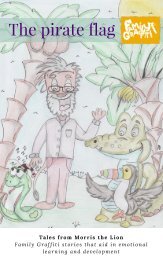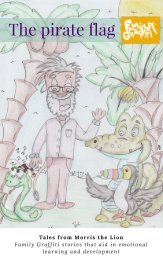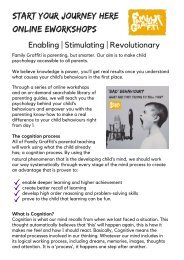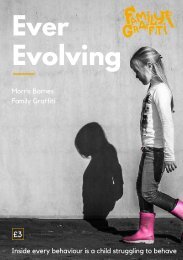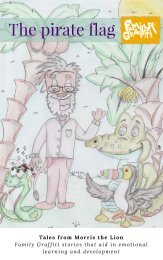Full brochure v2
Create successful ePaper yourself
Turn your PDF publications into a flip-book with our unique Google optimized e-Paper software.
Start your journey here<br />
online eworkshops<br />
Enabling | Stimulating | Revolutionary<br />
Family Graffiti is parenting, but smarter. Our aim is to make child<br />
psychology accessible to all parents.<br />
We believe knowledge is power, you’ll get real results once you understand<br />
what causes your child’s behaviours in the first place.<br />
Through a series of online workshops<br />
and an on-demand searchable library of<br />
parenting guides, we will teach you the<br />
psychology behind your child’s<br />
behaviours and empower you with the<br />
parenting know-how to make a real<br />
difference to your child behaviours right<br />
from day 1.<br />
The cognition process<br />
All of Family Graffiti’s parental teaching<br />
will work using what the child already<br />
has; a cognition process. By using the<br />
natural phenomenon that is the developing child’s mind, we should work<br />
our way systematically through every stage of the mind process to create<br />
an advantage that is proven to:<br />
enable deeper learning and higher achievement<br />
create better recall of learning<br />
develop high order reasoning and problem-solving skills<br />
prove to the child that learning can be fun.<br />
What is Cognition?<br />
Cognition is what our mind recalls from when we last faced a situation. This<br />
thought automatically believes that ‘this’ will happen again, this is how it<br />
makes me feel and how I should react. Basically, Cognitive means the<br />
mental processes involved in our thinking. Whatever our mind includes in<br />
its logical working process, including dreams, memories, images, thoughts<br />
and attention. It is a ‘process’, it happens one step after another.
It's a powerful gift: Having the<br />
ability to think before you act.<br />
The cognitive process:<br />
Receive information (learning: hearing, seeing, touching, sensing, tasting)<br />
Retain information (stored, indexed to previous events and ready for recall)<br />
Recall information (how we think, when an event re-occurs)<br />
Reacting to this information (how we behave, because of this thinking)<br />
A practical definition of cognition would be the process by which we learn,<br />
think, feel & understand. This process determines how we should react (behave)<br />
in a given situation.<br />
What is behaviour?<br />
Behaviour, therefore, is a reaction. We combine our thoughts and feelings<br />
about a current action or an upcoming event then we act on them. Adults can<br />
weigh up and consider the outcome or consequence of behaviour, but children<br />
have limited ability to do this.<br />
Cognitive Behaviour refers to everything that we do, and can be both ‘good’<br />
or ‘bad’ (although we prefer wanted or unwanted. This includes what we say,<br />
how we try to solve problems, how we react and also how we avoid certain<br />
situations. Behaviour refers to both action and inaction, when referring to a<br />
given situation. It is fashioned by our thinking process, rather than by an<br />
inherent need to be naughty or shy or unhappy.<br />
Weighing up the consequence and outcome of our behaviours is called<br />
cognitive reasoning, and this is a skill that children learn from watching and<br />
interpreting the world around them (especially you – their parent).<br />
Morris xx
The cognitive process<br />
Receive<br />
Retain<br />
Recall<br />
The starting point for all learning<br />
7% verbal, 93% witnessed<br />
Processing ability / speed input<br />
Good messages in: ensure good messages out<br />
Message memory store<br />
Compartmentalised correctly or confused<br />
Cognitive dysfunction and cognitive thinkers<br />
Usually where cognition starts going wrong<br />
With associated feelings<br />
Our perception of what may happen: Anxiety<br />
How to achieve goals, influences compliance<br />
Processing ability / speed output<br />
Reactions to cognitive processing<br />
All behavioural responses are created within this mechanism of the<br />
cognitive process often to hide frustrations, confusions, anxieties or<br />
poor communicative skills etc.<br />
Poor cognitive reactions can usually be changed by refocusing this<br />
cognitive process by putting new messages in to replace the old.<br />
Autistic and concrete thinkers are usually geniuses with facts, precision<br />
and routine, but are hampered in-part by a disorientated linkage<br />
between each process stage and feelings are usually not influential in<br />
their reactions. Keep communication short and factual.
Planting new seeds and feeding cognition<br />
Cognition<br />
Feelings<br />
The cognitive process is a function created<br />
pre-birth.<br />
It receives, records and retains all incoming<br />
messages (information).<br />
It retains all information as 'factual'.<br />
It recalls these memories when accessed.<br />
It can develop as a 'fact' from a 'seed'<br />
planted during early years learning.<br />
It can be replanted with an<br />
alternative 'seed' of truth to<br />
refocus a new fact.<br />
Feelings are very powerful.<br />
Feelings develop later than cognition.<br />
Feelings are ever evolving / changeable.<br />
Expressed emotions can be misleading.<br />
Linking the 'true child needs' to the<br />
emotional display is 'key' to our parenting<br />
response and our cognitive empathy.<br />
Use what<br />
They have<br />
Behaviour<br />
All children are born with a functioning<br />
cognitive process and with auto recording.<br />
It is their natural born instinct to learn.<br />
Most of what they learn is via mimicking.<br />
The cognitive process can be disrupted or<br />
dysfunctional because of many factors.<br />
'Old' learning can be replaced with 'new'.<br />
Don't challenge... repair instead<br />
Reactions are a mix of our thought process<br />
and any associated feelings.<br />
It may not be true but it sure feels real.<br />
Reactions are what others usually see and<br />
witness / recognise as 'behaviour'.<br />
All reactions are a 'learnt behaviour' and<br />
can be 're-learnt' to have different<br />
outcomes and provide the child with coping<br />
skills.





